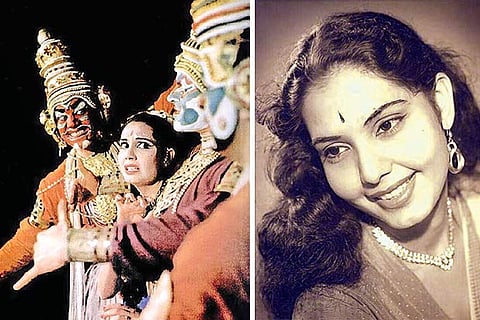

Chennai
It was a festive atmosphere on the Marina beach, which enamoured the little girl. Holding the hand of her uncle, lawyer Tanguturi Prakasam, the six-year-old girl watched hundreds of men and women in spotless white carrying colourful flags. There was a hum of expectation but when her uncle raised his hand, a pin drop silence ensued.
To the backdrop of the waves of the Bay of Bengal, the child was encouraged by her uncle to sing a short, patriotic song in Telugu. At the end of the song, the girl, Suryakumari, expected an applause. Instead, what followed was a thunderous roar, like that of the sea: Vande Mataram. Gandhiji ki jai.
After entrusting her to a friend, her uncle sprinted to the sea along with the enthused crowd and proceeded to make salt (protesting the British king who lorded over the Indian subcontinent. The child watched all the action cheerfully. That was when the mounted personnel of British police galloped in. Protestors were trampled and some were shot. To the little girl, it was a traumatic experience that moulded a part of her psyche.
As she grew up, Suryakumari sang in many freedom meetings. Her songs kept the crowd enthralled, and prevented it from thinning till the main speaker arrived. Over a short period, her presence was a major attraction at meetings of the Indian National Congress. Her songs that were recorded on gramophone penetrated the nook and corner of Telugu-speaking areas of Madras Presidency. Soon, Suryakumari became the independence movement’s Telugu voice.
Suryakumari’s family had moved to Sripuram in Madras from Andhra. She was a child prodigy with an unlikely combination of a mellifluous voice and an angelic face. She started singing at a very early age, almost as soon as she started talking. A client of her lawyer brother-in-law heard her sing, and Surya ended up being a film star at the age of 12. A special part was written into the film Vipranarayana (1937) to include her songs.
Soon, trams and buses in Madras carried film posters of her, but the ensuing popularity restricted her schooling. Instead, she started formal training in Carnatic music with Ariyakudi Ramanuja Iyengar and learnt Kuchipudi and Bharatanatyam from a member of Uday Shankar group. In a film career spanning almost two decades, Suryakumari did a variety of roles. In the film Krishna Prema, she played the role of sage Narada. It was crossdressing role, but one which fully utilised her talent to sing. Suryakumari also acted with Hindi film icon Dilip Kumar and was nominated for Filmfare Best Supporting Actress award.
After the linguistic division of Madras Presidency, there felt a need for a patriotic song for the newfound State, Andhra Pradesh. A song by Suryakumari, Maa Telugu Thalliki (to our mother Telugu), from the film Deenabandhu was identified as the official song of the State of Andhra. It is still sung at social and government functions.
Suryakumari contested in the first beauty pageant held in 1952, and was crowned Miss Madras. She then competed in Miss India, where she was the runner-up, losing to Indo American Miss Calcutta, Indrani. (Indrani was far from a Miss, being married and mother of two children by then.)
When the Motion Picture Association of America invited artistes from the Indian film industry to visit Hollywood, director Subramanyam and Suryakumari from south travelled with Raj Kapoor and Nargis among the 14 in the delegation.
When she was almost in the peak of her career, Surya did the unthinkable: ignoring all her fame and fortune, she completed her agreed performances and films, and went to the US. Living in a one-room flat, she tried to break into Hollywood but failed. The best she could achieve was to work as a research assistant and compere to Alfred Hitchcock’s television series.
After a lot of exertion, the circumstance changed. She portrayed Queen Sudarshana in Rabindranath Tagore’s play, The King of the Dark Chamber, in a Broadway play which ran houseful for eight performances a week for the whole year. Awards came her way commending her performance. Life magazine would portray Suryakumari for a whole page in colour.
But when her US visa was up for renewal, it was turned down, which prompted her to travel to London where she spent her remaining life performing music and theatre. Impressed by her role as goddess Kali in Kindly Monkeys, a play at the Arts Theatre, the BBC commissioned her to do a video series on Indian culture. She founded India Performing Arts, a project to train performers and stage productions. Married to an English poet, Suryakumari remained India’s cultural ambassador forever.
(With inputs from film historian Lakshmi Priya Pakanati)
—The author is a historian
Visit news.dtnext.in to explore our interactive epaper!
Download the DT Next app for more exciting features!
Click here for iOS
Click here for Android